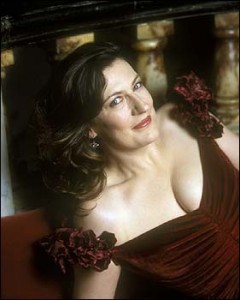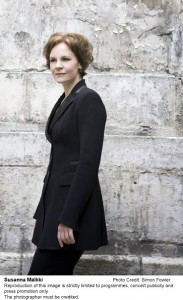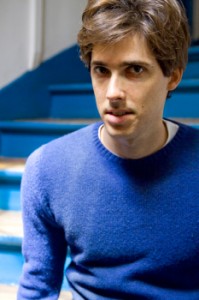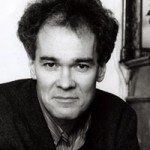Classical Music: The BBC Proms in London
By Caldwell Titcomb

Soprano Susan Gritton revealed a pure and soaring voice at the BBC Proms
The world’s largest festival of classical music is the BBC Proms in London. Founded in 1895 by Sir Henry Wood (who in 1918 was offered the conductorship of the Boston Symphony Orchestra but declined), the Proms this season run for two months from mid-July to mid-September. The core of the enterprise is a series of 76 concerts in the Royal Albert Hall (which accommodates an audience of about 8,000), augmented by events in other venues. All the concerts are broadcast both live and delayed on BBC Radio, and a considerable number are televised.
On a recent visit to London, I attended four Proms. One special feature this season is a focus on the year 1934, which gives us the 75th anniversary of the deaths of three eminent British composers – Gustav Holst, Frederick Delius, and Sir Edward Elgar – and the birth of the two foremost living British composers – Sir Peter Maxwell Davies and Sir Harrison Birtwistle.
I went to Prom 14, which offered works by the above trio. Holst’s biggest hit has always been “The Planets” (1914-16). But this time we got a rarity that had never before been performed at the Proms: the “First Choral Symphony,” Op. 41 (1923-24). He planned a second, but never got beyond a couple of fragmentary sketches, so the “first ” is expendable. The “Choral Symphony” is a huge work lasting almost an hour. For his texts Holst drew on his favorite poet, John Keats; aside from the celebrated “Ode on a Grecian Urn,” Holst selected relatively obscure verses.
The Prelude is an invocation to Pan, for chorus and orchestra. In the Song and Bacchanal the chorus alternates with a solo soprano. The very slow Ode is for chorus alone, as is the ensuing sprightly Scherzo and Trio. The slow Finale once again alternates chorus and solo, and the work ends softly. Much of the harmony is unusual, and the orchestral scoring is striking and largely restrained.
David Atherton (b. 1944) led the BBC National Orchestra of Wales in a compelling performance, assisted by 262 singers in the BBC National Chorus of Wales and the BBC Symphony Chorus. The solo soprano was Susan Gritton, who revealed a pure and soaring voice.
After intermission Atherton conducted Delius’ “Brigg Fair – An English Rhapsody” (1907), which had 35 Proms performances over the decades prior to this one. The term “rhapsody” might suggest a loose structure, but the work is actually a smoothly flowing set of 17 variations on the titular folk song. The orchestra put across the piece’s characteristically pastel scoring.
The concert concluded with Elgar’s familiar “Enigma Variations” (1898-99), in which the composer presented a series of musical portraits of himself, his wife, and a dozen friends (all of whom have now been identified). I have to admit that I am not an admirer of Elgar, but I concede that this is his one supreme masterpiece – and it is not surprising that it has been programmed at the Proms some 90 times. The orchestra was fully up to the work’s virtuoso demands.

Susanna Mälkki, a cellist who now has an extensive podium career.
This year’s schedule includes the wonderful if ubiquitous “Symphonie Fantastique” of Hector Berlioz (1803-69), who with Claude Debussy (1862-1918) is one of the two greatest French composers. But I was particularly excited by the chance to hear three Berlioz works that don’t get performed often. Prom 24 was conducted by Susanna Mälkki (b. 1969), a Finnish cellist who moved up to an extensive podium career.
She chose to conclude her program with the colossal Berlioz “Te Deum,” Op. 22 (1955), in which the orchestra is joined by organ, tenor soloist, and a huge chorus. She led the BBC Symphony Orchestra, assisted by organist Simon Preston, tenor Jörg Schneider, and 447 singers drawn from The Bach Choir, the BBC Symphony Chorus, the Crouch End Festival Chorus, the Choristers of St. Paul’s Cathedral, and the Trinity Boys Choir. Berlioz asked for four cymbalists, and we got them; he called for four sidedrums, and we got them too. The tenor sang his “Te ergo quaesumus” prayer smoothly. The following fugal “Judex crederis,” with its repeated-note theme, is one of the most magnificent stretches in all music and provided a fitting climax.
Also on the program was the premiere of “From Trumpet” by Ben Foskett (b. 1977), who was born in Germany, educated in England, and lives in Paris. This 14-minute work is based on one rhythmic cell, but seemed inchoate and poorly scored (there were two timpanists with three drums each, but it was impossible to make out what they were doing). Beethoven’s Symphony No. 4 got a spirited reading, though the third movement was so fast that some syncopated notes were slighted.
I returned the next night for Prom 25, which contained two more Berlioz rarities, led by Swiss conductor Thierry Fischer (b. 1957) at the helm of the BBC National Orchestra of Wales. He opened with Berlioz’s fascinating “Francs-Juges Overture” (1826-28). The lovely A-flat major second subject came from a lost quintet written at the age of 15 – his melodic gifts showed up early. Later we heard the “Symphonie Funèbre et Triomphale” (1840), commissioned by the French government for the 10th anniversary of the 1830 July Revolution. The work was composed for wind instruments and percussion, and is one of the great public ceremonial pieces, first performed in an outdoor procession. It was impressive to see an assemblage that included nine trombones, four bass tubas, eight trumpets, five cornets, four pairs of cymbals, and three bass drums.

Composer Ben Foskett
On each side of the podium was a row of four military sidedrummers. The opening sonata-form Funeral March is the most impressive movement. There follows the Funeral Oration, in which the “speaker” is a solo trombone, here eloquently played by Donal Bannister. The piece concludes with an Apotheosis, in which the instruments are joined by the shaking of a Turkish crescent or jingling Johnny – an ornamented pole with bells, trinkets, and plumes. The overall impact of this performance was simply tremendous.
Fischer also gave us the premiere of the expanded version of “Sillages” (“trails”) by Geneva native Michael Jarrell (b. 1958). This is a sort of triple concerto for solo woodwinds. The soloists were flutist Emmanuel Pahud, oboist François Leleux, and clarinetist Paul Meyer. The first of the two movements contained a lot of twittering and metallic sonorities in the percussion. The soloists, especially the clarinet, were frequently overpowered by the orchestra. The second movement was more active and rhythmically engaging. The concert ended with Beethoven’s Symphony No. 3 (“Eroica”), in which the exposition repeat was not observed; the reading was acceptable though not memorable. Obviously most of the rehearsal time was devoted to Berlioz.

Composer Michael Jarrell
In addition to the main roster of concerts in Albert Hall, there is an ancillary enterprise called Proms Chamber Music. This summer there are 19 concerts performed in Cadogan Hall (built in 1907), each taking place at midday or afternoon and running an hour or a little more. (These too are broadcast live and delayed on BBC Radio.) I attended PCM 3, which drew an audience close to the hall’s 900 capacity. Performing on this occasion was the Belcea Quartet (Corina Belcea-Fisher and Laura Samuel, violins; Krzysztof Chorzelski, viola; Antoine Lederlin, cello), founded at the Royal College of Music in 1994.
There were two works on the program. First came Franz Joseph Haydn’s Quartet in F-sharp Minor, Op. 50, No. 4 – one of a set of six published in 1787. The piece is not often played, though it is in some ways the most striking of the set. Haydn almost never cast a work in F-sharp minor. The sonata-form first movement is monothematic, the andante presents variations on alternating themes, and the minuet changes from F-sharp major to minor. The fast finale combines sonata-form with fugal procedures, and ends in assertive tragedy.
There followed Benjamin Britten’s Quartet No. 2 in C-major, Op. 36 (1945), his most frequently programmed chamber music. It was composed to commemorate the 250th anniversary of Henry Purcell’s death. In the C-minor scherzo all the instruments are instructed to play with mutes. The finale, titled “Chacony,” looks back to the chaconne or passacaglia of the Purcellian era, and exploits the slow dotted rhythm of the Baroque sarabande. It offers 22 variations on a nine-bar theme, interrupted only by solo cadenzas for cello, viola, and first violin. The quartet seems to end strongly in C-major, but then there are three short chords separated by long pauses – a compositional mistake. In both the Haydn and Britten the four players proved to be generally assured if not outstanding – the cellist not quite in a league with his colleagues.
Tagged: BBC Proms, Caldwell-Titcomb, Edward Elgar, Frederick Delius, Gustav-Holst, London, Sir Harrison Birtwistle.

Many thanks for your reviews. I was at both Berlioz concerts. My views on the first one is a bit different from yours.
Te deum on 2 August was a magnificent performance by the choruses; a good, but somewhat flawed performance by the conductor, I am afraid. She took the first movement very fast, as if she had to catch a plane or something. Throughout the work, her tempi were all over the place and it felt as if she didn’t have any overall conceptual picture in mind and was making it up as she was going along. The organ and brass instruments dominated the orchestra most of the time and drowned out the strings, and in the pizzicato parts, especially, you could hardly hear them if you were not watching the musicians playing them.
She rushed through the final movement too; her conducting totally lacked grace, electricity and the weight that are integral part of this movement. I had heard Colin Davis conducting Te Deum with the same number of performers at the RAH in 2000 and more recently, in February 2009, at the Barbican. There was no comparison.
Symphonie Funèbre on 3 August was a really magnificent performance that would have met with Berlioz’s approval: steady pulse, grandeur, beautiful ample sound, great orchestra, and even greater conductor. I am still under the spell of this performance 13 days on
[…] this link: Classical Music: The BBC Proms in London Tags: bbc, boston, boston-symphony, Classical Music, conductorship, enterprise, henry-wood, royal, […]